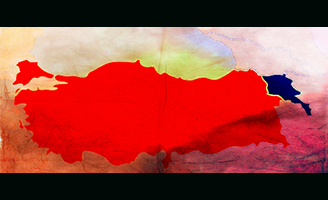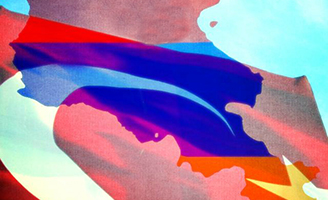Armenia debates reasons for Turkish helicopter's airspace violations
By Erik Davtyan
November 12th, the CACI Analyst
On October 6 and 7, Turkish military helicopters entered Armenia’s airspace near the village of Baghramyan in the Armavir region and remained for 2-4 minutes. The Head of Armenia’s General Department of Civil Aviation, Artyom Movsesyan, confirmed the violation in an interview to the Hraparak daily and said that Ankara’s explanation was that the helicopters had crossed into Armenian air space due to bad weather conditions. The Armenian-Turkish border has been closed for over 20 years (since 1993) and though the situation along the border is usually secure and calm, rare incidents on or near the border raise deep concerns in Armenia.
CACI Analyst, June 10, 2015
Contents
Analytical Articles
HANGING IN THE TRADE BALANCE: IS FREE TRADE A CURSE FOR KAZAKHSTAN?, by Sergei Gretsky
SHIFTING RUSSIAN POLICIES TOWARDS ALLIED SEPARATIST REGIONS, by Michael Hikari Cecire
AFGHANISTAN-PAKISTAN INTELLIGENCE COOPERATION AND THE PROSPECT OF PEACE, by Sudha Ramachandran
TURKEY-ARMENIA RELATIONS AFTER TURKEY'S ELECTIONS, by Armen Grigoryan
Field Reports
GEORGIA'S POLITICAL LANDSCAPE TRANSFORMS AS SENIOR UNM MEMBERS DEFECT, by Eka Janashia
KYRGYZ PARLIAMENT PASSES "FOREIGN AGENTS" LAW IN FIRST READING, by Arslan Sabyrbekov
AZERBAIJANI DIPLOMAT UNDER ATTACK AFTER COMMENTING BAKU FIRE, by Mina Muradova
THE RIGA SUMMIT AND NEW PROSPECTS FOR EU-ARMENIA RELATIONS, by Erik Davtyan
CACI Analyst, May 13, 2015
Contents
Analytical Articles
PAKISTAN AND AFGHANISTAN-INDIA COOPERATION, by Sudha Ramachandran
TURKEY, ARMENIA, AND THE POLITICS OF GENOCIDE RECOGNITION, by Emil Souleimanov
KAZAKHSTAN TO REFORM ITS CULTURAL SECTOR, by Rafis Abazov and Andrey Khazbulatov
WILL TURKISH STREAM COMPETE WITH THE SOUTHERN GAS CORRIDOR?, by Natalia Konarzewska
Field Reports
REPUBLICANS STRENGTHEN POSITION IN RESHUFFLED GEORGIAN GOVERNMENT, by Eka Janashia
KYRGYZSTAN TO HOLD ANOTHER CONSTITUTIONAL REFERENDUM, by Arslan Sabyrbekov
PRESIDENT SARGSYAN AND COUNTERPARTS COMMEMORATE ARMENIAN GENOCIDE, by Erik Davtyan
AZERBAIJAN CRACKS DOWN ON ACTIVISTS AHEAD OF EUROPEAN GAMES, by Mina Muradova
Turkey-Armenia Relations after Turkey’s Elections
By Armen Grigoryan (05/27/2015 issue of the CACI Analyst)
The outcome of Turkey’s recent parliamentary elections may partly reduce tensions in relations with Armenia, stopping the mounting hostile rhetoric of recent months. A normalization of bilateral relations should not be expected at this stage, but the trend of increasing cooperation in the humanitarian area, and in culture, tourism, and the media in recent years will likely continue. At the same time, some policies may need to be reassessed in consideration of regional security risks, including the growing level of militarization in the South Caucasus, increased tensions on the line of contact in Nagorno-Karabakh in the absence of progress in the negotiation process, as well as Russia’s capacity for manipulating the regional conflicts.

Turkey, Armenia, and the Politics of Genocide Recognition
By Emil Souleimanov (05/13/2015 issue of the CACI Analyst)
April 24th marked the centennial of what many have referred to as the first genocide of the 20th century. The anniversary of the tragic events in eastern Armenia that claimed the lives of hundreds of thousands of predominantly ethnic-Armenian subjects of the Ottoman Empire sparked renewed interest in the historical circumstances of the massacres which the Turkish authorities have refused to acknowledge as an act of genocide. Consequently, the political context of the genocide recognition has again come to the forefront of international reflections on the 1915 events.






